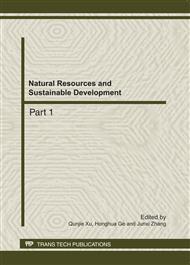[1]
N. Afgan, M. Carvalho, N. Hovanov, Energy system assessment with sustainability indicators, Energy Policy 28 (9) (2000) 603–612.
DOI: 10.1016/s0301-4215(00)00045-8
Google Scholar
[2]
J. Dewulf, H. Van Langenhove, J. Mulder, M. Van Den Berg, H. Van Der Kooi, J. De Swaan Arons, Illustrations towards quantifying the sustainability of technology, Green Chemistry 2 (3) (2000) 108–114.
DOI: 10.1039/b000015i
Google Scholar
[3]
A. Kumar, T. Kandpal, co2 emissions mitigation potential of some renewable energy technologies in india, Energy Sources, Part A: Recovery, Utilization and Environmental Effects 29 (13) (2007) 1203–1214.
DOI: 10.1080/009083190965343
Google Scholar
[4]
W. Norde, Energy and entropy: A thermodynamic approach to sustainability, Environmentalist 17 (1) (1997) 57–62.
Google Scholar
[5]
G. Liu, M. G. Rasul, M. T. O. Amannuallah, M. M. K. Khan, Environmental and economic analysis for grid-connected hybrid photovoltaic-wind power system in a hot arid environment, in: International Engineering Conference on Hot Arid Region (IECHAR 2010) Kingdom of Saudi Arabia, 2010.
DOI: 10.5383/ijtee.01.01.003
Google Scholar
[6]
G. H. Brundtland, Our common Fture, Oxford University Press, Oxford, 1987.
Google Scholar
[7]
N. H. Afgan, M. D. G. Carvalho, Quality, sustainability and indicators of energy systems, Begell House Inc., New York, 2010.
Google Scholar
[8]
M. Brenna, F. Foiadelli, M. Roscia, Sustainability energy indicators by means of fuzzy logic, in: 2007 IEEE Power Engineering Society General Meeting, PES, Tampa, FL, United states, 2010.
DOI: 10.1109/pes.2007.385585
Google Scholar
[9]
J. Elkington, Towards the sustainable corporation: Win-win-win business strategies for sustainable development, California Management Review 36 (2) (1994) 90–100.
DOI: 10.2307/41165746
Google Scholar
[10]
A. Evans, V. Strezov, T. Evans, Assessment of sustainability indicators for renewable energy technologies, Renewable and Sustainable Energy Reviews 13 (5) (2009) 1082–1088.
DOI: 10.1016/j.rser.2008.03.008
Google Scholar
[11]
T. Manzi, K. Lucas, T. Jones, J. Allen, Social sustainability in urban areas: Communities, connectivity and the urban fabric, Earthscan, London and Washington, DC, 2009.
DOI: 10.1080/17535069.2010.528604
Google Scholar
[12]
N. H. Afgan, M. G. Carvalho, Sustainability assessment of a hybrid energy system, Energy Policy 36 (8) (2008) 2893–2900.
Google Scholar
[13]
C. Kahraman (Ed.), Fuzzy multi-criteria decision making:Theory and applications with recent developments, Vol. 16, Springer, 2008.
Google Scholar
[14]
T. L. Saaty, The analytic hierarchy process: Planning, priority setting, resource allocation, McGraw-Hill, New York, 1980.
Google Scholar
[15]
C.-C. Sun, A performance evaluation model by integrating fuzzy ahp and fuzzy topsis methods, Expert Systems with Applications 37 (12) (2010) 7745–7754.
DOI: 10.1016/j.eswa.2010.04.066
Google Scholar
[16]
C.-C. Yang, B.-S. Chen, Key quality performance evaluation using fuzzy ahp, Journal of the Chinese Institute of Industrial Engineers 21 (6) (2004) 543–550.
DOI: 10.1080/10170660409509433
Google Scholar
[17]
D.-Y. Chang, Applications of the extent analysis method on fuzzy ahp, European Journal of Operational Research 95 (3) (1996) 649–655.
DOI: 10.1016/0377-2217(95)00300-2
Google Scholar
[18]
B. S. Richards, Quantifying Environmental Impact Assessments Using Fuzzy Logic, Springer, Troutdale, 2005.
Google Scholar
[19]
N. H. Afgan, M. G. Carvalho, Sustainability assessment of hydrogen energy systems, international Journal of Hydrogen Energy 29 (13) (2004) 1327–1342.
DOI: 10.1016/j.ijhydene.2004.01.005
Google Scholar
[20]
L. Zadeh, Fuzzy sets, Information Control 8 (1965) 338–353.
Google Scholar
[21]
J. Lu, G. Zhang, D. Ruan, F.Wu, Multi-objective group decision making: Method, software, and applications with fuzzy set techniques, Vol. 6, Imperial College Press, Chicago, 2007.
DOI: 10.1142/p505
Google Scholar
[22]
Z. Ayag, R. Ozdemir, A fuzzy ahp approach to evaluating machine tool alternatives, Journal of Intelligent Manufacturing 17 (2) (2006) 179–190.
DOI: 10.1007/s10845-005-6635-1
Google Scholar
[23]
E. Heo, J. Kim, K.-J. Boo, Analysis of the assessment factors for renewable energy dissemination program evaluation using fuzzy ahp, Renewable and Sustainable Energy Reviews 14 (8) (2010) 2214–2220.
DOI: 10.1016/j.rser.2010.01.020
Google Scholar
[24]
D. Du, P. Q. Hua, Y.Wu, Modern comprehensive assessment methods and cases study, Tsinghua University Press, Beijing, 2008.
Google Scholar
[25]
N. Afgan, M. Darwish, Multi-criteria sustainability assessment of water desalination and energy systems - kuwait case, Desalination and Water Treatment 25 (1-3) (2011) 241–250.
DOI: 10.5004/dwt.2011.1764
Google Scholar


